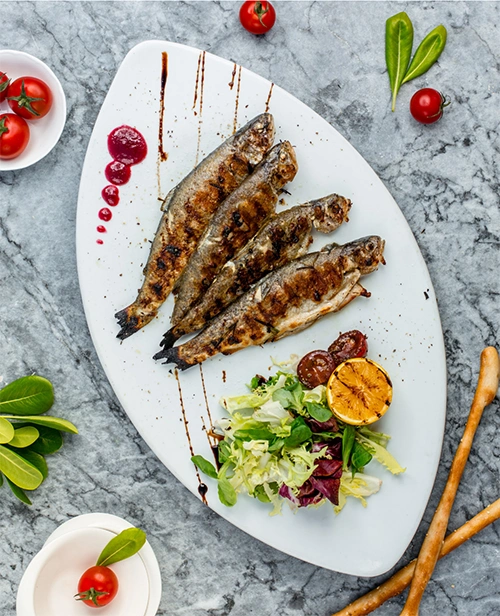

Top Health Benefits of Grilled sardines You Need to Know
Grilled sardines are a nutritional powerhouse, packed with high-quality protein, heart-healthy omega-3 fatty acids, and essential vitamins and minerals such as vitamin B12, vitamin D, calcium, and selenium. These small fish are an excellent source of anti-inflammatory fats that support brain health, reduce cardiovascular risk, and promote healthy cholesterol levels. Since sardines are low on the food chain, they contain minimal mercury, making them a safer seafood choice. Accompanied by fresh greens and lemon, this dish also provides dietary fiber, antioxidants, and vitamin C, enhancing digestion and immune support. The inclusion of olive oil adds additional monounsaturated fats that help with nutrient absorption and further contribute to heart health. All in all, this dish is not just delicious, but deeply nourishing for the body and mind.
Recipe :
For 4 people
Enjoy your healthy and flavorful Mediterranean-style sardines!
When preparing grilled sardines, it's important to start with the freshest fish possible—look for bright, clear eyes and firm, shiny skin. Cleaning the sardines thoroughly is key: remove the innards gently and rinse under cold water. Marinating the fish in a mix of olive oil, lemon juice, garlic, and fresh herbs for at least 30 minutes will enhance flavor and tenderness. Avoid over-salting during marination, especially if you're following a low-sodium diet. When grilling, preheat the grill to high heat and oil the grates to prevent sticking. Cook the sardines for just a few minutes per side; overcooking can dry them out and make them too firm. Serve immediately with lemon wedges and fresh greens. Be mindful of small bones, which are edible but can be bothersome to some diners. Lastly, always ensure proper hygiene when handling raw fish to avoid contamination.

This dish is ideal for several popular dietary plans, especially those focusing on whole, nutrient-dense foods. It perfectly fits into ketogenic, Mediterranean, paleo, high-protein, and gluten-free diets due to its low carbohydrate content, healthy fats, and clean protein profile. However, it is not suitable for vegan or vegetarian diets due to the presence of fish. Those following a low-calorie plan might find the fat content relatively high, especially with added olive oil, so portion control is advised. It may also require adjustments for individuals on the DASH (Dietary Approaches to Stop Hypertension) diet, as sodium levels should be kept low—limiting added salt or using low-sodium seasoning blends would help. For those practicing intermittent fasting, this meal is ideal to break a fast as it is rich in nutrients and easy to digest. Always consider individual health needs and dietary goals when incorporating this meal into your routine.
...